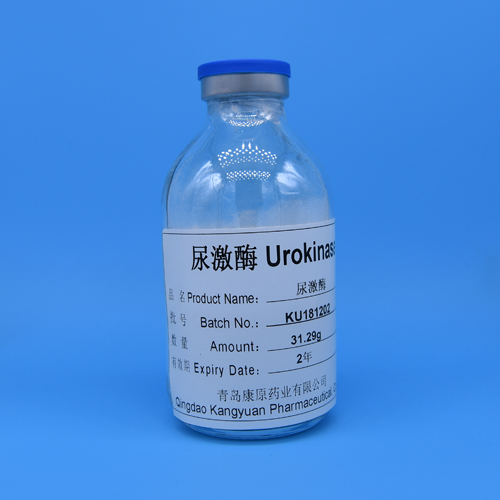Urokinase from human urine
Other names: urinary activin; U-fibrinogen activator
Vitality: p 120000 iu/mg
Potency: 5 ~ 60000IU/mg
Activity definition: 1 unit of enzyme required for hydrolysis of 1 mole
be-ala-gly-arg-4na per minute at 37℃, pH8.8
Solubility: fully dissolved within 60 seconds (3000IU/ml)
Dry weight loss: ≤5.0%
Sterility test (bacteria) : comply with regulations
Sterility test (fungus) : comply with regulations
High polymer content: ≥85% (M.W.54000)
Pyrogen: in compliance with regulations (20000IU/ ml.kg. rabbit)

Endotoxin: ≤2 EU/2000IU
Abnormal toxicity: negative (2500IU/0.5 ml/ mouse)
Hbs-ag: Negative (50000 IU/ml)
Anti-hiv I + II: Negative (50,000 IU/ml)
Nti-hcv Abs: Negative (50000 IU/ml)
Urokinase character: white or similar white freeze-dried powder.
Proteolytic enzyme of human urine or kidney cells. The natural substrate is
plasminogen. Sensitive to moisture. Soluble in water. Dry powder was stable at
4℃, and aqueous solution was stable at 4℃ for 3 days.
Urokinase USES: Biochemical studies. It is a protease that cuts fibrinogen
(Plasminogen) to form plasmin (plasmin). It binds to cell surface receptor
(uPAR), regulates cell adhesion tissue remodeling and migration, and also
activates intracellular signal transduction pathways. Urokinase is a three-part
domain. The aminoterminal domain, which is co-derived from the epidermal growth
factor, is a protease domain that binds to the carboxyl terminal via the central
Kringle domain.
Urokinase preservation: -20℃